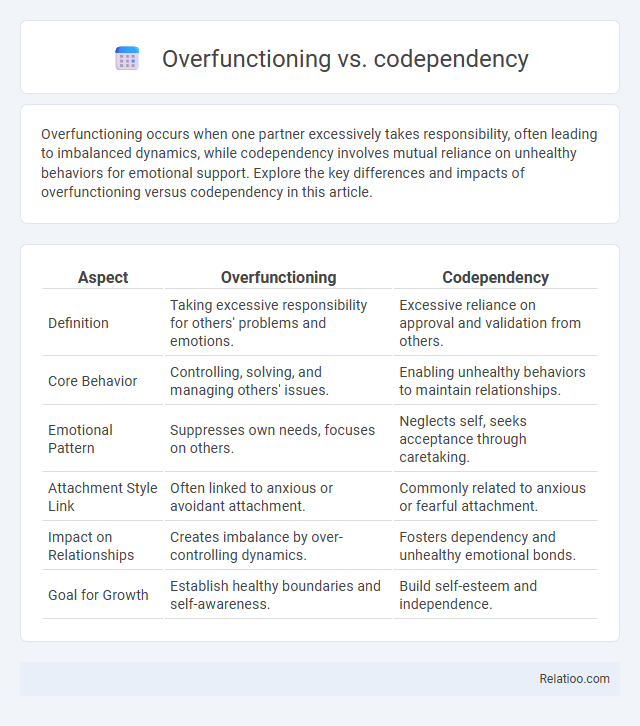Overfunctioning occurs when one partner excessively takes responsibility, often leading to imbalanced dynamics, while codependency involves mutual reliance on unhealthy behaviors for emotional support. Explore the key differences and impacts of overfunctioning versus codependency in this article.
Table of Comparison
| Aspect | Overfunctioning | Codependency |
|---|---|---|
| Definition | Taking excessive responsibility for others' problems and emotions. | Excessive reliance on approval and validation from others. |
| Core Behavior | Controlling, solving, and managing others' issues. | Enabling unhealthy behaviors to maintain relationships. |
| Emotional Pattern | Suppresses own needs, focuses on others. | Neglects self, seeks acceptance through caretaking. |
| Attachment Style Link | Often linked to anxious or avoidant attachment. | Commonly related to anxious or fearful attachment. |
| Impact on Relationships | Creates imbalance by over-controlling dynamics. | Fosters dependency and unhealthy emotional bonds. |
| Goal for Growth | Establish healthy boundaries and self-awareness. | Build self-esteem and independence. |
Understanding Overfunctioning: A Comprehensive Overview
Overfunctioning occurs when one individual consistently takes on excessive responsibility or control, often to compensate for another's perceived dysfunction or inability, which differs fundamentally from codependency that involves emotional reliance on another's approval or behavior. In comparison, codependency centers on an imbalanced relational dynamic driven by a need to care or fix, while overfunctioning highlights an action-based pattern of doing more than is healthy for oneself or the relationship. Recognizing the behavioral patterns, emotional triggers, and consequences of overfunctioning is crucial in therapeutic settings to establish healthier boundaries and promote interdependence.
Defining Codependency in Relationships
Codependency in relationships describes a dysfunctional dynamic where one person overfunctions by consistently taking responsibility for others' feelings and problems, often at the expense of their own well-being. This imbalance leads to emotional dependency, enabling unhealthy behaviors and preventing personal growth for both parties. Defining codependency involves recognizing patterns of excessive caretaking, lack of boundaries, and an unhealthy need for approval or control within relational interactions.
Key Differences Between Overfunctioning and Codependency
Overfunctioning involves consistently taking on tasks and responsibilities to maintain control, while codependency centers on an excessive emotional reliance on others, often neglecting your own needs. Key differences include overfunctioning's focus on action and control versus codependency's emphasis on emotional dependency and enabling behaviors. Understanding these distinctions can help you recognize unhealthy patterns and foster healthier relationship dynamics.
Signs and Symptoms of Overfunctioning
Signs and symptoms of overfunctioning include excessive control over situations, taking on others' responsibilities, and difficulty delegating tasks, often leading to burnout. Overfunctioning individuals may also exhibit perfectionism, resistance to asking for help, and neglect their own needs in favor of solving others' problems. This behavior can mask codependency, where emotional reliance on others is marked by seeking approval and avoiding conflict, but overfunctioning specifically centers on actions rather than emotional dependence.
Recognizing Codependent Behaviors
Recognizing codependent behaviors involves identifying patterns where one excessively relies on another for approval, sense of identity, or emotional support, often at the expense of personal boundaries. Overfunctioning manifests as taking on excessive responsibility for others' problems, leading to burnout and enabling dysfunctional dynamics, while codependency typically includes an emotional dependence on controlling or rescuing others. Differentiating these behaviors requires awareness of the motivations behind actions and the impact on self-care, autonomy, and relational health.
Psychological Roots of Overfunctioning and Codependency
Overfunctioning and codependency both stem from deep psychological roots related to self-esteem and control, where individuals overfunction to compensate for feelings of inadequacy or fear of abandonment. Overfunctioning often arises from early family dynamics that reward caregiving behaviors to maintain stability, while codependency is rooted in an excessive emotional reliance on others for validation and identity. These patterns are reinforced by maladaptive coping mechanisms developed during childhood, leading to difficulty setting boundaries and an imbalance in interpersonal relationships.
The Impact on Personal and Professional Relationships
Overfunctioning often leads to burnout and resentment, negatively affecting both personal and professional relationships by creating imbalance and dependency. Codependency fosters unhealthy attachments, where individuals excessively rely on each other for approval and identity, undermining autonomy and mutual respect. Overfunctioning in relationships blurs boundaries, causing one party to control or enable dysfunction, which impairs communication and trust, critical factors for relationship sustainability.
Breaking the Cycle: Strategies for Change
Breaking the cycle of overfunctioning and codependency requires recognizing unhealthy patterns and setting firm personal boundaries to regain your autonomy. Therapeutic approaches like cognitive-behavioral therapy (CBT) and mindfulness can help reframe limiting beliefs and foster emotional resilience. Building self-awareness and practicing self-care enables you to shift from enabling behaviors to healthy interdependence in relationships.
Setting Healthy Boundaries for Recovery
Setting healthy boundaries is crucial for recovery from overfunctioning and codependency, as it promotes self-respect and autonomy in relationships. Recognizing personal limits and communicating them effectively helps prevent enabling behaviors and reduces emotional exhaustion. Therapy approaches like Cognitive Behavioral Therapy (CBT) and Dialectical Behavior Therapy (DBT) often emphasize boundary-setting as a foundational skill for sustainable healing.
Seeking Help: Therapy and Support Resources
Seeking help for overfunctioning or codependency involves recognizing patterns that can undermine mental health and relationships. Therapy options such as cognitive-behavioral therapy (CBT), dialectical behavior therapy (DBT), and support groups like Codependents Anonymous (CoDA) offer tailored strategies to build healthier boundaries and self-awareness. Accessing professional counseling and community resources is essential for developing sustainable coping mechanisms and emotional resilience.

Infographic: Overfunctioning vs Codependency
 relatioo.com
relatioo.com